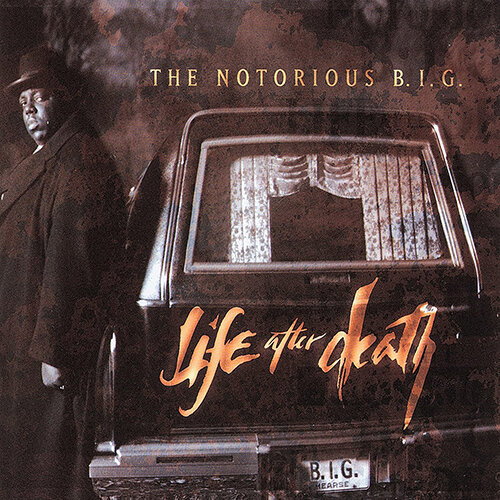#179 Notorious B.I.G., 'Life After Death' (1997)
‘Life After Death,’ Notorious B.I.G.’s second and final album, is a direct sequel to ‘Ready To Die,’ his debut album. The album starts with the title track, which is a continuation of ‘Suicidal Thoughts,’ the third last song on that record. With this album, Biggie was just getting started. A double album, it was his magnum opus. It’s long, clocking in at 2 hours, but he had a lot to say. A good chunk of the record addresses his various feuds. For example, ‘Kick In The Door’ is about Nas, Jeru the Damaja, Raekwon, Ghostface Killah and even the track's producer DJ Premier. Of course, there are plenty of references to the most famous feud in Hip Hop history, and Biggie takes many an opportunity to hit out at the recently deceased Tupac. To be fair, though, the album was recorded and ready to go on Halloween 1996, but Biggie was involved in a car accident in September 1996, which delayed the release.
Biggie had released ‘Hypnotize’ as the first single on 1 March 1996 ahead of the album release. It was an instant hit on radio and debuted at #2 on the charts. A week later on 9 March, Biggie was murdered in a drive-by shooting. The album would be released 2 weeks later on 25 March. ‘Hypnotize’ went to #1 on his death, making Notorious B.I.G. the fifth artist in history to have a post-humous #1 (others being Otis Redding, Janis Joplin, Jim Croce, John Lennon). That track is my favourite on the album. It’s just such an infectious tune, thanks to its groove care of Herb Alpert. ‘Somebody’s Gotta Die,’ ‘Kick In The Door,’ ‘Mo Money Mo Problems,’ featuring Puff Daddy & Mase and samples Diana Ross’s ‘I’m Coming Out’ (#394), ‘I Love The Dough’ feat. Jay-Z and a sample of Rod Stewart’s ‘Do Ya Think I’m Sexy,’ and so many others. To be honest, I really like Biggie’s voice and delivery. Some of the songs are a bit much in terms of the whole Mafioso Rap theme and it becomes a bit of an exhausting listen after an hour. Notorious B.I.G. is often credited with the transition of Hip Hop from a darker sound to a more clean, sample-heavy sound, which helped the genre break into the mainstream. It’s chilling to hear all the references to his being shot and killed, or his references to Tupac’s death, which, as mentioned, all came before he died. I’m yet to watch the new Biggie doco on Netflix, but it’s on the immediate list to watch.
#rs500albums
